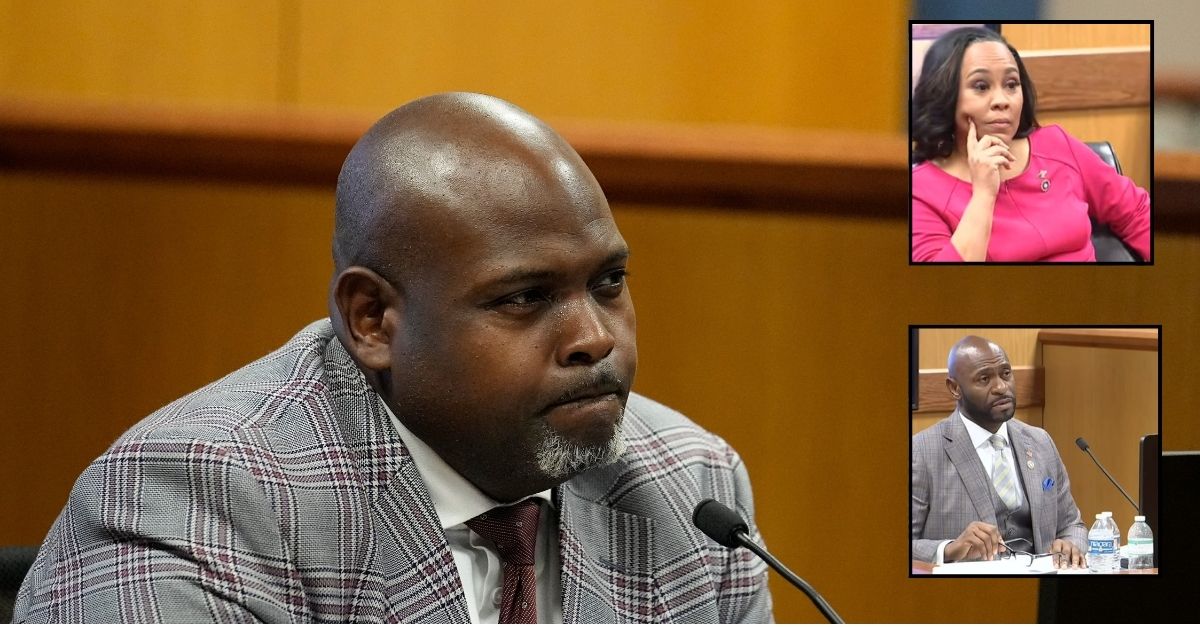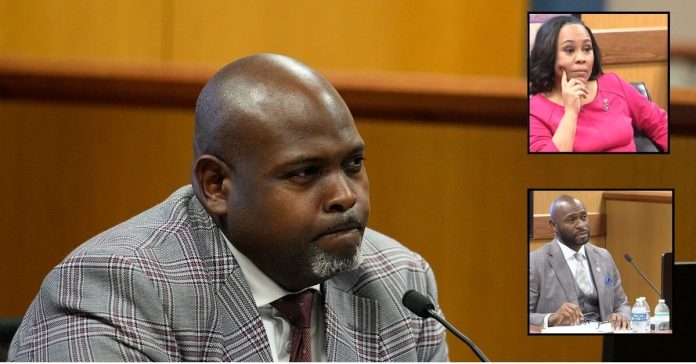
Terrence Bradley, Special prosecutor Nathan Wade’s former law partner and onetime divorce attorney, testifies in court Tuesday, Feb. 27, 2024, in Atlanta. (AP Photo/Brynn Anderson, Pool) Inset bottom right: Nathan Wade appears during a Fulton County court hearing on Feb. 15, 2024. (Law&Crime Network); Inset top right: Fani Willis appears during a Fulton County court hearing on Feb. 15, 2024. (Law&Crime Network)
An unforced tactical error by a special prosecutor working for the Fulton County District Attorney’s Office led to a bit of a wash in court on Tuesday afternoon during a pretrial hearing in the racketeering (RICO) case against Donald Trump and others.
“I don’t recall,” was the phrase du jour during testimony from divorce attorney Terrence Bradley as he answered question after question about a litany of issues regarding the romantic relationship between District Attorney Fani Willis and special prosecutor Nathan Wade.
The witness, under scrutiny for why he previously said the pair “absolutely” began dating before Willis hired Wade, was often evasive under oath. He frequently had to have his memory refreshed about past statements. And, at least once, changed his answer to a question after being shown an exhibit that disproved his earlier testimony.
Asked point blank about whether he lied when he previously made claims about the timeline of the relationship, roughly 10 seconds passed before Bradley tentatively answered: “Did I lie?”
“That’s a simple question, Mr. Bradley, you’re a lawyer,” defense attorney Richard Rice, who represents Robert Cheeley, retorted.
Throughout the day, however, the answers seemed far from simple.
How we got here
In early January, a petit upheaval in the case brought by Willis against the 45th president began to unfold and quickly snowballed.
In a searing and still-to-be-decided motion, co-defendant Michael Roman — a former Trump 2020 staffer accused of a role in the fake electors plot — publicized the district attorney’s romantic relationship with her hand-picked lead. Roman’s goal, by now well-known, is to have Willis, along with her entire office and her especially-hired lieutenants, thrown off the case. Many other defendants happily joined those motions on the burgeoning docket.
The ongoing disruption has only gathered strength since then.
On Feb. 12, after weeks of will-he-or-won’t-he speculation — and several bouts of dueling motions from various co-defendants and the state attempting to influence his opinion — Fulton County Superior Court Judge Scott McAfee gave the defense a decided victory.
The allegations of nepotism and self-dealing against Willis and Wade were serious enough to warrant sworn testimony in a special hearing. And, if proven, the claims “could result in disqualification,” he ruled.
Over the course of a two-day hearing, the upshot was largely mixed.
Wade, bristling under subpoena, testified their relationship did not become romantic until sometime in 2022. Willis, who previously battled her own subpoena, dramatically sauntered into the courtroom and performed a volte-face: insisting she wanted to testify. The angry district attorney mostly echoed the special prosecutor on key points, agreeing they did not become romantic with one another until 2022.
Earlier on day one, the defense drew blood when Robin Yeartie, a former employee of the district attorney’s office — who said she was long “best friends” with Willis after the pair met in college — testified the two lawyers began their romantic relationship sometime in late 2019.
The second day of the hearing formed the basis for today’s testimony.
Wade’s former divorce attorney, Terrence Bradley, clearly did not want to answer questions. He often glared at Roman’s defense attorney, Ashleigh Merchant, for bringing him into the whole mess.
Though the earlier hearing established that Bradley, at the very least, told Merchant things that led her to genuinely believe Wade began the romantic relationship with Willis well before she hired him to work at the Fulton County DA’s office, the witness seemingly dodged bullets.
Bradley was repeatedly barred from testifying about the Wade-Willis affair when the state and his own attorney invoked the attorney-client privilege — extremely limiting and diluting the impact of his comments to Merchant referencing the disputed relationship timeline.
But late in the day, as a surprise to almost everyone in the courtroom, the state accused Bradley of sexual assault. This shocking turn of events ended up undercutting substantial portions of his prior testimony. In turn, the now-wide gulf led the judge to question whether Bradley or the other parties claiming privilege had properly understood how to apply the privilege from the get-go.
On Monday, after an in camera hearing with Bradley and Bradley’s attorney, the court found the privilege had not, in fact, been properly applied to at least some portions of Bradley’s testimony.
“[T]he interested parties did not meet their burden of establishing that the communication(s) are covered by attorney-client privilege and therefore the hearing can resume as to Mr. Bradley’s examination,” McAfee ruled.
Developing …
Have a tip we should know? [email protected]

